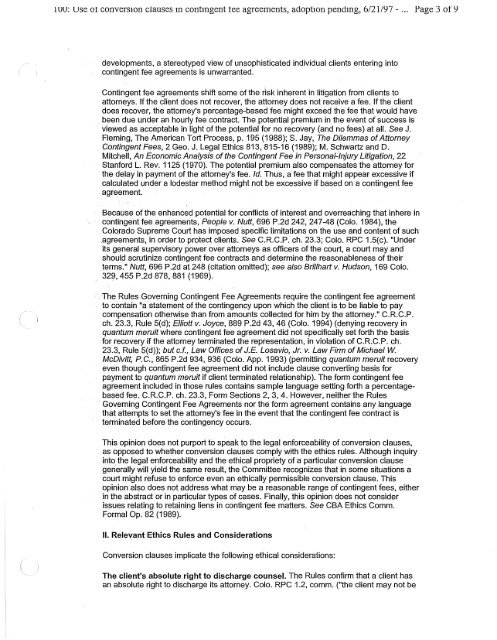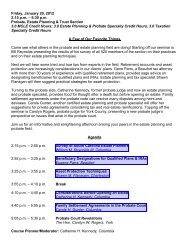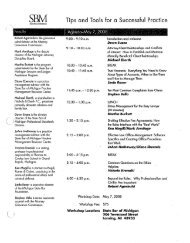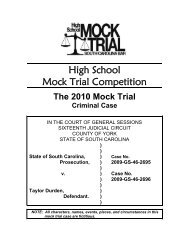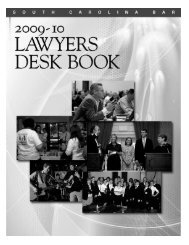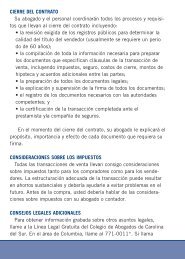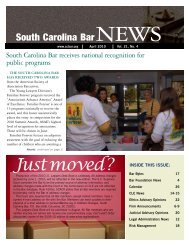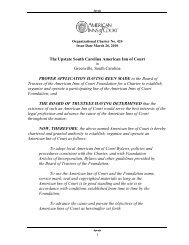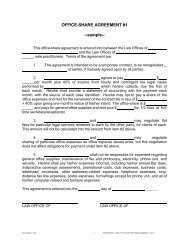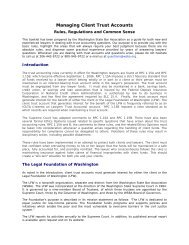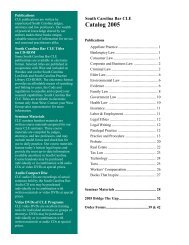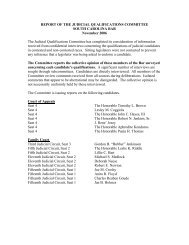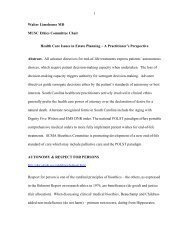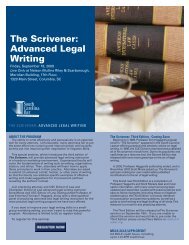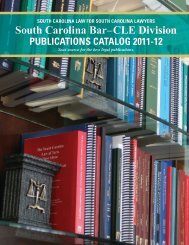Practicing With Professionalism - South Carolina Bar Association
Practicing With Professionalism - South Carolina Bar Association
Practicing With Professionalism - South Carolina Bar Association
You also want an ePaper? Increase the reach of your titles
YUMPU automatically turns print PDFs into web optimized ePapers that Google loves.
1UU: Use ot converSIOn clauses In contmgent tee agreements, adoptIOn pendmg, 6/21/Y7 - ...<br />
Page 3 ofY<br />
developments, a stereotyped view of unsophisticated individual clients entering into<br />
contingent fee agreements is unwarranted.<br />
Contingent fee agreements shift some of the fisk inherent in litigation from clients to<br />
attorneys. If the client does not recover, the attorney does not receive a fee. If the client<br />
does recover, the attorney's percentage-based fee might exceed the fee that would have<br />
been due under an hourly fee contract. The potential premium in the event of success is<br />
viewed as· acceptable in light of the potential for no recovery (and no fees) at all. See J.<br />
Fleming, The American Tort Process, p. 195 (1988); S. Jay, The Dilemmas ofAttorney<br />
Contingent Fees, 2 Geo. J. Legal Ethics 813, 815-16 (1989); M. Schwartz and D.<br />
Mitchell, An Economic Analysis ofthe Contingent Fee in Personal-Injury Litigation, 22<br />
Stanford L. Rev. 1125 (1970). The potential premium also compensates the attorney for<br />
the delay in payment of the attorney's fee. Id. Thus, a fee that might appear excessive if<br />
calculated under a lodestar method might not be excessive if based on a contingent fee<br />
agreement.<br />
Because of the enhanced potential for conflicts of interest and overreaching that inhere in<br />
contingent fee agreements, People v. Nutt, 696 P.2d 242,247-48 (Colo. 1984), the<br />
Colorado Supreme Court has imposed specific limitations on the use and content of such<br />
agreements, in order to protect clients. See C.RC.P. ch. 23.3; Colo. RPC 1.5(c). "Under<br />
its general supervisory power over attorneys as officers of the court, a court may and<br />
should scrutinize contingent fee contracts and determine the reasonableness of their<br />
terms." Nutt, 696 P.2d at 248 (citation omitted); see also Brillhart v. Hudson, 169 Colo.<br />
329,455 P.2d 878, 881 (1969).<br />
The Rules Governing Contingent Fee Agreements require the contingent fee agreement<br />
to contain "a statement of the contingency upon which the client is to be liable to pay<br />
compensation otherwise than from amounts collected for him by the attorney." C.RC.P.<br />
ch. 23.3, Rule 5(d); Elliott v. Joyce, 889 P.2d 43, 46 (Colo. 1994) (denying recovery in<br />
quantum meruit where contingent fee agreement did not specifically set forth the basis<br />
for recovery if the attorney terminated the representation, in violation of C.RC.P. ch.<br />
23.3, Rule 5(d)); but c.f., Law Offices ofJ.E. Losavio, Jr. v. Law Firm ofMichael W.<br />
McDivitt, P.C., 865 P.2d 934,936 (Colo. App. 1993) (permitting quantum meruit recovery<br />
even though contingent fee agreement did not include clause converting basis for<br />
payment to quantum meruit if client terminated relationship). The form contingent fee<br />
agreement included in those rules contains sample language setting forth a percentagebased<br />
fee. C.RC.P. ch. 23.3, Form Sections 2, 3,4. However, neither the Rules<br />
Governing Contingent Fee Agreements nor the form agreement contains any language<br />
that attempts to set the attorney's fee in the event that the contingent fee contract is<br />
terminated before the contingency occurs.<br />
This opinion does not purport to speak to the legal enforceability of conversion clauses,<br />
as opposed to whether conversion clauses comply with the ethics rules. Although inquiry<br />
into the legal enforceability and the ethical propriety of a particular conversion clause<br />
gen"erallywill yield the same result, the Committee recognizes that in some situations a<br />
court might refuse to enforce even an ethically permissible conversion clause. This<br />
opinion also does not address what may be a reasonable range of contingent fees, either<br />
in the abstract or in particular types of cases. Finally, this opinion does not consider<br />
issues relating to retaining liens in contingent fee matters. See CBA Ethics Comm.<br />
Formal Op. 82 (1989). .<br />
II. Relevant Ethics Rules and Considerations<br />
Conversion clauses implicate the following ethical considerations:<br />
The client's absolute right to discharge counsel. The Rules confirm that a client has<br />
an absolute right to discharge its attorney. Colo. RPC 1.2, comm. ("the client may not be


